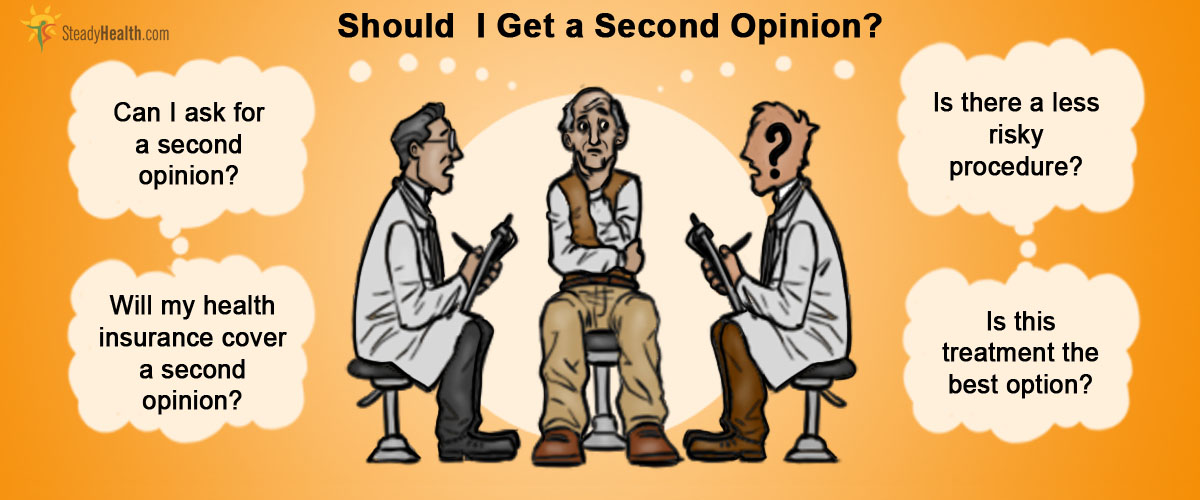Table of Contents
Doctors are only human and even the most trained specialists can make mistakes from time to time. Sometimes getting a second opinion, which means you see another specialist after your diagnosis or plan, could be beneficial. Statistics even show that getting a second opinion might reduce false diagnosis by around 50 percent.
Why would someone even what a second opinion in the first place? Doesn't your doctor know best?
There are various scenarios where patients would probably want a second opinion from another physician. A common experience among healthy individuals who go for a routine executive check-up is that of being told that something turned up in their laboratory results, which needs to be evaluated further. These people often have no symptoms and are not ready to hear any bad news regarding their health. But then they are asked to undergo another test, which leads them to see a specialist who subsequently recommends a procedure, such as cardiac catheterization, that will prevent a future catastrophe, such as a heart attack. Shocked with such a proposition, the patient naturally wants to be sure if they really need the procedure done, considering that they never even thought they were sick.
Others might simply want peace of mine and to be absolutely sure that their doctor is right. Whatever the reason, before you ask for a second opinion, you may want to consider these factors first.
Another scenario is that of a sick patient who would rather hear from another expert that the dreaded diagnosis is probably flawed or that a more conservative form of treatment will make him get better, even without surgery. Still, some patients who have seen a doctor just once or a few times would like to go to someone else they trust, especially if a doctor-patient relationship has not been well established.
They discuss interesting cases in their grand rounds and conferences. And it is not uncommon for doctors to have varying opinions, based on their clinical experience and expertise. Furthermore, it is also possible that a second opinion does not lead a patient to a decision or acceptance of his situation, but instead leads him to seek a third or fourth opinion until he finds the answers to his questions or likes what he hears.
Although a few physicians will not appreciate a patient's need to hear another expert opinion, many doctors will recommend that their patients get a second opinion, and will even give them a referral to another colleague or known expert. However, it is often the patient's initiative which will drive him to seek further information to get proper treatment.
When and Why Should You Get a Second Opinion?
Just as there are many patients who seek a second opinion, there are some patients who are not sure if they should ask for one. Some patients are afraid their doctors might not be pleased if they learn that their patient did not trust them while others are not sure if their health insurance will cover the cost of getting a second opinion. However, unless there is an extreme emergency where a procedure could save your life, experts strongly recommend seeking a second opinion in these instances:
-
When a recommended procedure involves a high risk of dying, suffering a stroke or incurring severe infection. Examples include heart bypass surgery or valvular heart disease surgery.
-
When a doctor recommends cardiac catheterization even if you have no symptoms.
-
When a doctor recommends elective hysterectomy, but there are other options of treatment such as hormonal therapy or other conservative measures.
-
When a doctor recommends terminating a pregnancy because of a suspected fetal abnormality. Parents must not make a decision that could be based on a wrong diagnosis.
-
When a doctor recommends surgery to treat varicose veins. More conservative measures such as laser treatments, sclerotherapy (involves injections), and use of compression stockings are available and could be tried before getting into an operating room.
-
When the doctor gives you a diagnosis for brain tumor, which requires surgery. It may be worthwhile to confirm the diagnosis with another brain expert before getting a major operation on the brain.
-
When a doctor recommends surgery for atrial fibrillation, which is best managed conservatively.
- When your high blood pressure is resistant to a number of medications.
- When you are advised to have a pacemaker implanted for fainting spells or lightheadedness, without clear evidence of bradycardia (slow heart rates). Seek a second opinion, too, if you have slow heart rates but no fainting spells or lightheadedness and are advised to get a pacemaker.
See Also: Report Says U.S. Doctors Prescribe Too Much Drugs And Don't Think About Alternative Treatments
- When a treatment regimen consists of using branded medicationswithout benefit of choosing generic medications.
-
When you are asked to undergo expensive screen tests even if you have no symptoms.
- WebMD. Second Opinions. http://www.webmd.com/a-to-z-guides/second-opinions
- AHA. Getting a Second Medical Opinion. http://www.heart.org/HEARTORG/Conditions/More/MyHeartandStrokeNews/Getting-a-Second-Medical-Opinion_UCM_434325_Article.jsp
- CNN. Five diagnoses that call for a second opinion. http://edition.cnn.com/2007/HEALTH/08/30/ep.second.opinion/index.html
- Van de Graaff, E. Never hesitate to seek a second medical opinion. http://www.kevinmd.com/blog/2010/11/hesitate-seek-medical-opinion.html
- Mindmap by steadyhealth.com
- Photo courtesy of Fotos GOVBA by Flickr : www.flickr.com/photos/agecombahia/6283387508/
- www.webmd.com
- www.heart.org
- edition.cnn.com
- www.kevinmd.com


